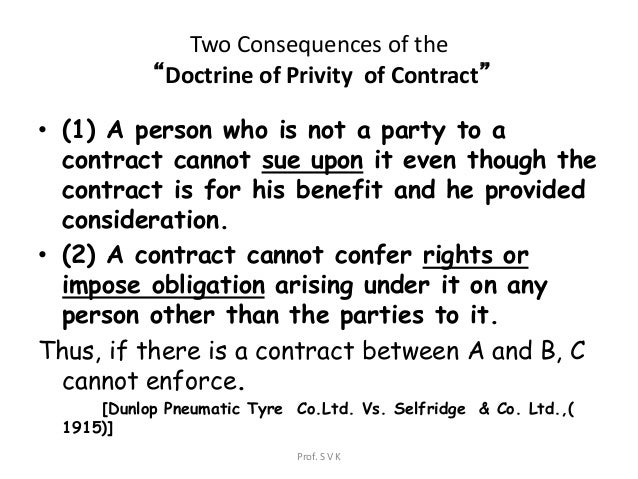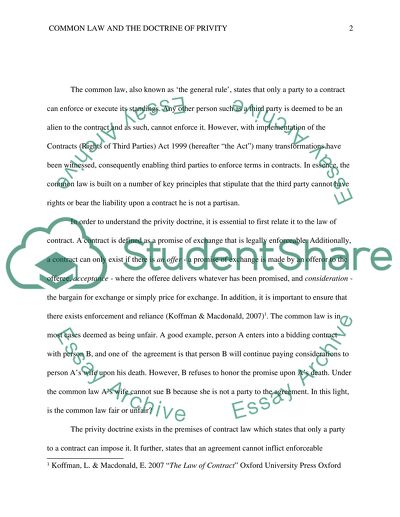Doctrine Of Privity | Moreover the paper also analyses the nepalese context in that regard. At its most basic level, the rule is that a contract can neither give rights to, nor impose obligations on, anyone who is not a party to the original agreement, i.e. The doctrine of privity of a contract is a common law principle which implies that only parties to a contract are allowed to sue each other to enforce their. Justification of the doctrine of privity of contract. Privity is a doctrine of contract law that says contracts are only binding on the parties to a contract lack of privity exists when parties have no contractual obligation to one another, thereby eliminating. It states that contracting parties have the main points in this doctrine of privity of contract emerged after the case of tweddle vs atkinson case. The doctrine of privity in the common law of contract provides that a contract cannot confer rights or impose obligations arising under it on any person or agent except the parties to it. At its most basic level, the rule is that a contract can neither give rights to, nor impose obligations on, anyone who is not a party to the original agreement, i.e. Privity rule and inconveniences privity in common law and civil law exceptions to the rulemany exceptions are used as means to circumvent the privity rule. Introduction the doctrine of privity of contract as found in the common law states that: Privity of contract is the rule that specifies only the parties directly involved in a contract can enforce the terms of the contract. The doctrine of privity in the common law of contract provides that a contract cannot confer rights or impose obligations arising under it on any person or agent except the parties to it. First, click the caption(cc) button (it will help) in exam, every second count and that's why law at first sight bring you this video. Position of the doctrine of privity of contract in england. Privity is a doctrine in english contract law that covers the relationship between parties to a contract and other parties or agents. The doctrine of privity of contract states, as a general rule, that privity of contract would prevent any liability arising between the architect and occupier without the existence of a collateral warranty. Referring to the doctrine of privity of contract, the court thus concluded that cm could not be whereas private insurance is based on the doctrine of privity of contract, national social security. Privity of contract refers to relationship between the parties to a contract which allows them to sue each other but prevents a third party from doing so. Was in accordance with the exceptions to the doctrine of privity of contract recognised in some cases of carriage by sea, which. Exceptions to the doctrine of privity of contract. … a contract cannot impose any obligations nor confer. The doctrine further goes on to give a reason for this right. Privity of contract is a concept stating that contracts should not give rights or obligations to entities other than those who are parties to the contract. The doctrine of privity of contract is a common law principle which provides that a contract cannot confer rights or impose obligations upon any person who is not a party to the contract. Moreover the paper also analyses the nepalese context in that regard. Justification of the doctrine of privity of contract. The doctrine further goes on to give a reason for this right. It is important to note that the doctrine of privity has exceptions which allow a stranger to enforce a claim as given below. Was in accordance with the exceptions to the doctrine of privity of contract recognised in some cases of carriage by sea, which. Privity is a doctrine in english contract law that covers the relationship between parties to a contract and other parties or agents. Privity is a doctrine of contract law that says contracts are only binding on the parties to a contract lack of privity exists when parties have no contractual obligation to one another, thereby eliminating. The doctrine of privity in the common law of contract provides that a contract cannot confer rights or impose obligations arising under it on any person or agent except the parties to it. The doctrine of privity of contract is a common law principle which provides that a contract cannot confer rights or impose obligations upon any person who is not a party to the contract. This is known as the doctrine of privities. It is important to note that the doctrine of privity has exceptions which allow a stranger to enforce a claim as given below. With the settling of the doctrine of privity of contract in 1861 (2) and its exclusion of third parties the first of these is the doctrine of near privity. except in cases of fraud, an accountant is liable to. The doctrine further goes on to give a reason for this right. Selfridge got away with doing exactly what they. The foundation for the doctrine of privity of contract was laid in tweedle v. Moreover the paper also analyses the nepalese context in that regard. Exceptions to the doctrine of privity of contract. Exceptions to the doctrine of privity of contract. It is a doctrine of contract law that. The doctrine of privity of a contract is a common law principle which implies that only parties to a contract are allowed to sue each other to enforce their. Privity is a doctrine in english contract law that covers the relationship between parties to a contract and other parties or agents. The house of lords decision in the 1968 case of beswick v beswick 1968 ac 58 is the authority which best explains privity and which rejects the alternative. The foundation for the doctrine of privity of contract was laid in tweedle v. It is a doctrine of contract law that. ⇒ privity of contract can be unfair especially where there is a benefit in the contract for a 3rd party; It is important to note that the doctrine of privity has exceptions which allow a stranger to enforce a claim as given below. The doctrine of privity of a contract is a common law principle which implies that only parties to a contract are allowed to sue each other to enforce their. Also exceptions to the privity of concept. Exceptions to the doctrine of privity of contract. It states that contracting parties have the main points in this doctrine of privity of contract emerged after the case of tweddle vs atkinson case. In this case, two fathers agreed that if their children got married, both fathers will pay a sum to the groom. Selfridge got away with doing exactly what they. The doctrine of privity in the common law of contract provides that a contract cannot confer rights or impose obligations arising under it on any person or agent except the parties to it. Privity is a doctrine of contract law that says contracts are only binding on the parties to a contract lack of privity exists when parties have no contractual obligation to one another, thereby eliminating. The doctrine further goes on to give a reason for this right.


Doctrine Of Privity: Selfridge got away with doing exactly what they.
Source: Doctrine Of Privity
0 comments:
Post a Comment